- Home
- Janice Kay Johnson - His Best Friend's Baby
Finding Hope
Finding Hope Read online
PRAISE FOR TURNING HOME
“Johnson has a gift for portraying emotional depth and vulnerability in just a few subtle glances and fleeting touches. . . . This is sure to win readers’ hearts.”
—Publishers Weekly
“Well-written with complex, realistic characters. . . . A touching story.”
—The Avid Reader
“A wonderful story of healing hearts and new beginnings.”
—Pink Granny’s Journey
MORE PRAISE FOR THE NOVELS OF JANICE KAY JOHNSON
“Janice Kay Johnson wins our hearts with appealing characters in this poignant tale of sacrifice, healing, and family relationships.”
—Romantic Times
“Well-written characters living through complex situations that are neither glossed over nor magically solved. . . . A lovely romance with strong, likable characters.”
—Her Hands, My Hands
“Johnson writes in a way that conveys real life very well and, at the same time, makes romance seem possible for normal people in everyday places.”
—All About Romance
“Believable characters that demonstrate admirable growth and sensitivity. Remarkable in scope, beautifully realized with plot and characterizations. . . . Very highly recommended.”
—Word Weaving
Titles by Janice Kay Johnson
Turning Home
Mending Hearts
Finding Hope
A JOVE BOOK
Published by Berkley
An imprint of Penguin Random House LLC
penguinrandomhouse.com
Copyright © 2021 by Janice Kay Johnson
Scripture taken from the New King James Version®. Copyright © 1982 by Thomas Nelson. Used by permission. All rights reserved.
Penguin Random House supports copyright. Copyright fuels creativity, encourages diverse voices, promotes free speech, and creates a vibrant culture. Thank you for buying an authorized edition of this book and for complying with copyright laws by not reproducing, scanning, or distributing any part of it in any form without permission. You are supporting writers and allowing Penguin Random House to continue to publish books for every reader.
A JOVE BOOK, BERKLEY, and the BERKLEY & B colophon are registered trademarks of Penguin Random House LLC.
Ebook ISBN: 9780593198018
First Edition: June 2021
Book design by Gaelyn Galbreath, adapted for ebook by Cora Wigen
This is a work of fiction. Names, characters, places, and incidents either are the product of the author’s imagination or are used fictitiously, and any resemblance to actual persons, living or dead, business establishments, events, or locales is entirely coincidental.
Cover design by Ally Andryshak
Cover art by PixelWorks
pid_prh_5.7.1_c0_r0
Contents
Cover
Praise for the Novels of Janice Kay Johnson
Titles by Janice Kay Johnson
Title Page
Copyright
Chapter One
Chapter Two
Chapter Three
Chapter Four
Chapter Five
Chapter Six
Chapter Seven
Chapter Eight
Chapter Nine
Chapter Ten
Chapter Eleven
Chapter Twelve
Chapter Thirteen
Chapter Fourteen
Chapter Fifteen
Chapter Sixteen
Chapter Seventeen
Chapter Eighteen
Chapter Nineteen
Chapter Twenty
Chapter Twenty-One
Chapter Twenty-Two
Chapter Twenty-Three
Chapter Twenty-Four
Chapter Twenty-Five
Chapter Twenty-Six
Acknowledgments
About the Author
Chapter One
Hannah Prescott stirred the fresh rosemary she’d chopped into the mix of melted cheeses and cream. Inhaling, she smiled. This was one of her favorite dinners—who didn’t love mac and cheese?—and she thought her take on it, after much experimentation, was divine.
Too bad her boss refused to even consider adding it to the menu.
“Don’t care how good it is,” he’d told her. “It’s macaroni and cheese. People expect it to come out of a box. That’s not what they want when they pay good money to go out to the hottest restaurant in Lexington.”
End of subject.
Well, to heck with him.
She added salt and pepper, tasted, and stirred in the penne rigate pasta before pouring it all into a ceramic baking dish. After popping it in the oven, she set the timer and took out asparagus from the refrigerator.
Her phone rang from somewhere in the living room. She hesitated, hoping it wasn’t Greg desperately needing her to fill in because someone hadn’t shown up to work and the restaurant would be jam-packed tonight.
He didn’t do that often, so if he needed her, she’d go in. But when she picked her phone up from where she’d left it on the coffee table, she saw the number was her mother’s. Since Hannah hadn’t talked to her in . . . oh, it had to be close to a month, certainly longer than they usually went between calls, she answered with cautious pleasure.
“Mom.”
“Sweetheart.” Jodi Prescott had a dreamy voice men tended to like. “It’s been forever since we talked! I always worry about you, and you haven’t kept me up to date. Are you still seeing that other chef?”
Hannah had to cast her mind back. The last time she’d dated . . . “Grant Summerlin? No, we didn’t go out for long. Chefs work long and inconvenient hours. You know that. Since he’s the executive chef at a trendy new restaurant, his hours are even worse than mine. Coordinating our rare evenings off was a nightmare. And . . . it just wasn’t worth it.”
Sad to say, that’s what she concluded every time she became briefly interested in a man. There’d been a couple of really nice guys from her church who at least shared her values, but neither had enough patience to accommodate her work schedule. And really, there hadn’t been any zing.
“What about you, Mom?” she asked. Her mother almost always had a man thinking he was privileged to take care of her.
Well, except for the losers expecting her to take care of them. Hannah’s mother had never had good instincts where men were concerned.
Which might be why her daughter had surrounded herself with a force field that refused to let anyone in. Once you lost the ability to trust, regaining it became a task that resembled climbing Mount Everest without oxygen or a guide. Especially without a guide.
“Oh, Dale and I broke up,” her mother said, something a little off in her tone. “Listen, I have a favor to ask of you.”
Hannah braced herself. Her mother trailed unpaid bills the way a pickup truck did plumes of dust on a dirt road.
“This will sound really silly,” her mother said, “but I don’t want you to answer any calls from unfamiliar numbers. I’m sure they’ll try to reach you, but they’ve made awful accusations, none of which are true, and I don’t want you involved.”
Not what she’d expected. “What kind of accusations?”
“What difference does it make?” Jodi sounded suddenly petulant. “There’s no reason for you to be involved, that’s all. You have to trust me and . . . and not talk to anyone! Can you do that? Just promise me?”
“Is this someone I know?”
“No! It doesn’t have anything to do with you!�
��
Blinking in bewilderment, Hannah asked, “Then why would these people want to talk to me?”
Her mother began to cry. Whether Mom did it consciously or not, she had a way of turning on the hysterical tears to get her way whenever an argument took a turn for the worse—from her point of view, of course. The tears worked splendidly on the men in Jodi’s life, until the enchantment wore off—or said men didn’t turn out to be as useful as she thought they would be.
Hannah winced at her cynicism. She was being uncharitable, and she did love her mother despite everything. How could she not? Mom was all she had. Still, Hannah had become hardened to the weeping ploy many years ago.
Trying for a soothing voice, she said, “You know I’ll help if you tell me what you need.”
“I need you not to talk to any strangers who call!” her mother screamed.
Hannah held the phone away from her ear. What on earth—?
“Promise me?”
“Mom . . .”
“Oh!” her mother exclaimed, and ended the call.
Shocked, Hannah discovered that she’d retreated to the kitchen while they talked. Always her refuge. Now, she backed up until she could sink down on a stool. Still clutching the phone, she stared into space, not really seeing the tiny table with a place set for one, or the bunch of daffodils she’d impulsively bought to bring spring indoors.
Jodi had never been the cookies-and-milk-after-school kind of mother—any cookies came in packages from the grocery store or, once Hannah was ten or eleven, were baked by her—but the call had definitely been weird, even by her standards.
What kinds of accusations could anybody make now? When Hannah was a child, school authorities or social service workers had definitely circled, suspecting Hannah’s mother wasn’t providing a secure home life for her, one reason for the frequent moves that meant constantly starting over. But Hannah hadn’t been a minor in a long time—she was twenty-seven now, and hadn’t lived with her mother since she graduated from high school.
Nearly a decade ago.
Had someone Mom lived with died, and she was considered a suspect in an investigation? Or did this have to do with drugs? Hannah didn’t think her mother had ever used illegal drugs, but some of the men who came and went in their lives had. Now, who knew? But that wouldn’t have anything to do with her daughter, who hadn’t seen her since Christmas, which they’d celebrated here.
A thought crept into her head. Her mother had never been willing to talk about Hannah’s father. Not a word beyond an insistence that he couldn’t be bothered with them.
What if these accusations had something to do with him? As an adult, Hannah had speculated about why her mother had never remarried. If she was widowed or divorced, wouldn’t you think . . . ?
A buzzer went off, and she jerked.
Oh, my. Her macaroni and cheese was done, and smelled amazing. To heck with the asparagus, she decided. Right now, comfort food was exactly what she needed.
Hands enveloped in two quilted potholders, she carefully removed the casserole dish from the oven and set it on the stove. Even as she reached for a serving spoon, she asked herself the big question.
What if her phone did ring, and that unfamiliar number came up? Should she answer? Or do as her mother asked?
But it wasn’t really even a question, was it? Hannah knew herself too well.
* * *
* * *
Midafternoon the next day, she’d just stowed her purse and thin jacket in a locker in the small break room at work when her phone rang. The number and area code were both unfamiliar. Oh, boy—this was lousy timing. She hesitated, then looked toward her boss, who both owned the restaurant and was executive chef.
“This is important. I really need to take it.”
Greg’s bushy eyebrows rose, but he nodded. In the three years since he’d hired her as his sous chef, she’d never once taken a phone call during working hours. Since she seldom dated and had few friends outside her co-workers, the phone didn’t actually ring very often.
The next minute, he slapped a firm hand on the back of a young kitchen helper, knocking him forward a step, and began a lecture.
Hannah turned her back and answered. “Hello?”
“Is this Hannah?” a woman asked her tremulously.
“Yes. I’m Hannah Prescott.” Closing her locker with a clang, she went out the back door and sat on a wrought-iron chair that was part of a set placed out here for employees but seldom used, because they rarely had a moment to sit down. Given that this was an alley with a few parking spots, the view wasn’t sublime, but traffic noise was less distracting than people talking.
“Jodi’s daughter?” the woman pressed.
“Yes.”
“Oh, my goodness. I was so afraid I’d never have a chance to hear your voice again.”
“I don’t understand,” Hannah said. “Who are you?”
There was a small sniff. “I’m your grandmother.”
Her mouth fell open. “I . . . why haven’t I ever met you?”
“You have,” the woman said sadly. “Your grandfather and I saw you at least once a week until your mother took you away when you were five. You don’t remember?”
Hannah’s memories from that early were next to nonexistent: a jumble of faces, images, and sounds. The clop of horse hooves. The glow of hot metal, a deep rumble of laughter, the texture of a man’s wiry beard. An older man and woman were in there somewhere, but—
“Mom said you were dead.”
“No, and you still have another grandmother, too. We just couldn’t find you. We hired a private detective twice, and he’d find traces of where you’d been, but Jodi had always taken you and moved again. And then—”
When the woman—her grandmother?—spoke again, she sounded broken. “And then we were told you’d both been killed in a car accident.”
“What?”
“Oh, yes. That’s when you would have been eleven or twelve. The man who called identified himself as a police officer. He sent us a copy of the death certificates.”
Winded, Hannah tried to understand. For all her mother’s flaws, she wouldn’t have done something that awful, would she? Feeling sick, she said, “We lived with a police officer for about a year. In Illinois, I think, although that might not be right. We moved a lot.”
“The death certificates were from Jackson County, Illinois.” There was a pause. “Your mother admitted to us that a sheriff’s deputy she had . . . dated made the phone call and was responsible for creating the false death certificates. She was just so afraid we’d find you, Jodi said. She wanted us off her back.”
That was grief Hannah was hearing, pure and simple. An echo of it seemed to be awakening inside her. “I don’t understand any of this,” she admitted.
“I don’t, either,” her grandmother said with aching slowness.
My grandmother. And grandfather. She had one of those, too.
“Where do you live?” Hannah asked, as if that were the most important thing she needed to know.
“Tompkin’s Mill. It’s a small town in northern Missouri. That’s where you grew up until Jodi left your father.”
Hannah’s heart hammered. Her father. She swallowed. “Is he alive?”
“Yes, and he’s never been able to put you out of his mind. I haven’t let him know yet, because I thought I’d call you first. Is . . . is there any chance you can come for a visit?”
“Missouri.” Oddly, she visualized a map. “I don’t think we ever lived there. We moved all around it—Illinois, Iowa, I think Indiana once, Kentucky, Tennessee, Arkansas, Oklahoma, Kansas. I’m not sure about Nebraska.”
Her grandmother understood. “You circled around Missouri. Around home.”
Like a dance, Hannah thought, except nothing about their late-night departures and the shabby apartments or h
ouses they’d left behind had been graceful.
“Until we were told both of you were dead, we kept thinking Jodi would call, if only to ask for money, but she didn’t until now.”
“That’s why you’ve talked to her.” Hannah felt dumb, not having even wondered. Although, her mind swarmed with so many questions it was hard to pin any one down.
“Yes.” There was the weariness, the sadness, again. “It sounds like she just . . . ran out of resources. Didn’t she call you?”
“She’s borrowed money a couple of times in the last six months, but she knows I don’t have much to spare.” Hannah frowned. “She gave you my phone number?”
“In exchange for a check.”
So Mom was desperate.
Jobs and men both might be harder to come by for a fifty-year-old woman than they had been when she was twenty or thirty, Hannah realized. Jodi had kept her figure, mostly, but she was developing arthritis in her hands, and when her expression changed, the lines in her face didn’t smooth out as quickly as they used to. Of course, Jodi would never let herself turn gray, but the roots of her hair must sometimes betray her when she couldn’t afford a touch-up at a salon.
Mom had given her parents Hannah’s number, then panicked. These were the accusations she’d feared. The lies. Hannah’s grandparents weren’t dead. They had grieved for their lost daughter and granddaughter all these years.
And my father. To let him think his child was dead . . .
How could Mom have done that to all of them? Hannah asked herself on a painful stab of anger. To me?
“I didn’t think to ask your name,” she said. “Except, I guess it has to be Prescott?”
“No, and unless Jodi married a man who adopted you along the way, it isn’t your name, either. Or hers. I’m Helen Hinsch. Your grandfather is Robert.”
She couldn’t breathe. Whispered, “Then . . . what is my name? What’s my father’s name?”
“He’s Samuel Mast. Like I said, unless you were adopted, you’re Hannah Mast.”
That seemed like an odd last name, but . . . familiar? Now she panicked. No, it couldn’t be. She hardly remembered a thing about those years, certainly not a last name.

 Home Deadly Home
Home Deadly Home From Father to Son
From Father to Son All the Lost Little Horses (A Desperation Creek Novel Book 2)
All the Lost Little Horses (A Desperation Creek Novel Book 2) Hide the Child
Hide the Child Within Range
Within Range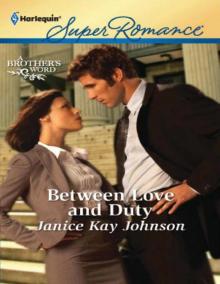 Between Love and Duty
Between Love and Duty First Comes Baby
First Comes Baby Charlotte's Homecoming
Charlotte's Homecoming In A Heartbeat (HQR Superromance)
In A Heartbeat (HQR Superromance) The Call of Bravery
The Call of Bravery In Hope's Shadow
In Hope's Shadow Anything for Her
Anything for Her Harlequin Superromance September 2014 - Bundle 1 of 2: This Good ManPromises Under the Peach TreeHusband by Choice
Harlequin Superromance September 2014 - Bundle 1 of 2: This Good ManPromises Under the Peach TreeHusband by Choice The Baby Agenda
The Baby Agenda More Than Neighbors
More Than Neighbors Her Amish Protectors
Her Amish Protectors All That Remains
All That Remains Whisper of Revenge (A Cape Trouble Novel Book 4)
Whisper of Revenge (A Cape Trouble Novel Book 4) In a Heartbeat
In a Heartbeat A Mother's Claim
A Mother's Claim Because of a Girl
Because of a Girl Back Against the Wall
Back Against the Wall Dangerous Waters
Dangerous Waters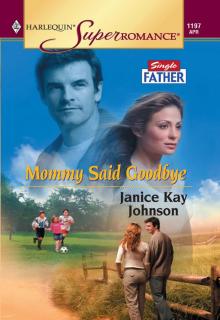 Mommy Said Goodbye
Mommy Said Goodbye A Mother's Secret
A Mother's Secret See How She Runs (A Cape Trouble Novel Book 2)
See How She Runs (A Cape Trouble Novel Book 2) Plain Refuge
Plain Refuge Bringing Maddie Home
Bringing Maddie Home For the Girls' Sake
For the Girls' Sake Through the Sheriff's Eyes
Through the Sheriff's Eyes Yesterday's Gone (Two Daughters Book 1)
Yesterday's Gone (Two Daughters Book 1) All a Man Is
All a Man Is Harlequin Superromance January 2014 - Bundle 1 of 2: Everywhere She GoesA Promise for the BabyThat Summer at the Shore
Harlequin Superromance January 2014 - Bundle 1 of 2: Everywhere She GoesA Promise for the BabyThat Summer at the Shore No Matter What
No Matter What Wakefield College 01 - Where It May Lead
Wakefield College 01 - Where It May Lead Someone Like Her
Someone Like Her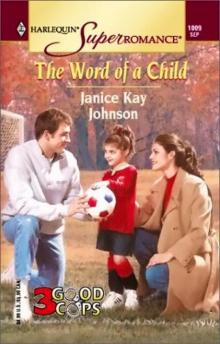 THE WORD OF A CHILD
THE WORD OF A CHILD Harlequin Superromance May 2016 Box Set
Harlequin Superromance May 2016 Box Set Open Secret
Open Secret The New Man
The New Man Finding Her Dad
Finding Her Dad The Perfect Mom
The Perfect Mom All Through The House
All Through The House Match Made in Court
Match Made in Court Making Her Way Home
Making Her Way Home From This Day On
From This Day On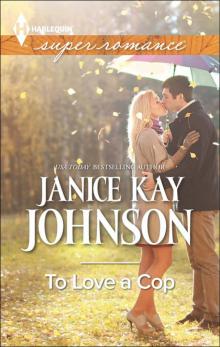 To Love a Cop
To Love a Cop The Hero's Redemption
The Hero's Redemption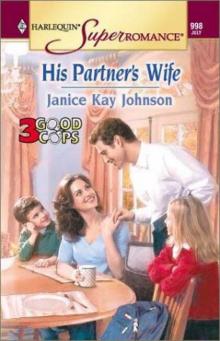 HIS PARTNER'S WIFE
HIS PARTNER'S WIFE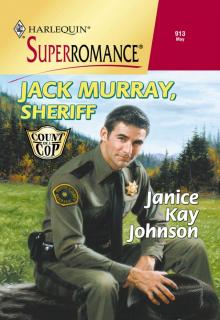 Jack Murray, Sheriff
Jack Murray, Sheriff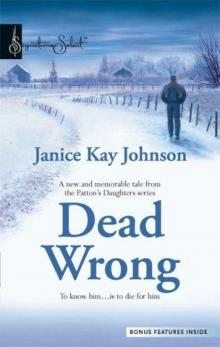 Dead Wrong
Dead Wrong Twisted Threads (A Cape Trouble Novel Book 3)
Twisted Threads (A Cape Trouble Novel Book 3) Bone Deep
Bone Deep The Closer He Gets
The Closer He Gets With Child
With Child Whose Baby?
Whose Baby? Kids by Christmas
Kids by Christmas